Yolngu man Yingiya Guyula could transform Northern Territory government by bridging culture and politics
Yingiya Mark Guyula points to a day – and an encounter with federal police – on a bush road on his grandmother’s country near Ramingining as a watershed moment.
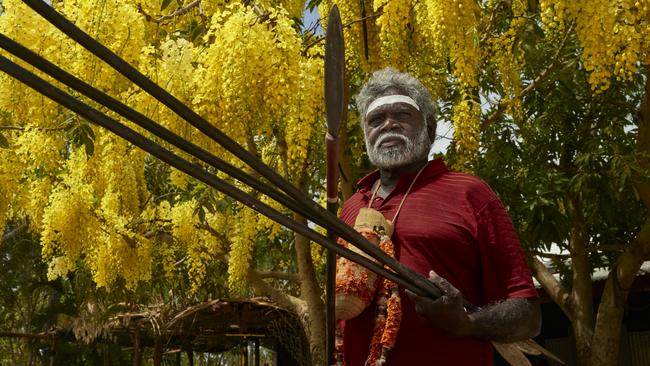
The dress code is casual. The schedule, invisible. The location: remote. Yingiya Mark Guyula stands barefoot at the edge of his 35-year-old niece’s half-dug grave, scratching his neat grey beard. Campfires burn. Billies boil. Insects buzz. The deep hum of yidaki (didgeridoo) starts up and stops – a kind of pre-ceremony sound-check. The funeral has already been going for three days, and will continue for at least another four.
It’s November 2023, the time of year the Top End calls the build-up, AKA the sweaty season, and Bunhangura, in northeast Arnhem Land, is overflowing with mourners.
Guyula, 65, speaks in Djambarrpuyngu – a dialect of Yolngu Matha and one of 26 languages he is fluent in – to an older man wearing an unseasonable blue flannelette shirt. Others join them to peer into the hole. The burial preparations have hit a problem. Two problems, actually: a pair of enormous rocks. People have been taking turns digging with a spade and crowbar, but their rusty tools aren’t going to cut it now.
Guyula listens as people grave-side throw out suggestions. The simplest solution would be to get some machinery in to do the job, but that would mean delaying the burial, and no one is keen on moving the rocks anyway.
“[Rocks] are images of creators that were from this land,” Guyula explains. “The spiritual beings of this land.” To move them, he says, would require permission from every clan here.
So that’s what Guyula does. He moves around the tiny community, speaking with each group of Yolngu. He calls it “diplomacy”, something he’s skilled at in his life as a senior leader and elder of the Liya-Dhalinymirr clan of the Djambarrpuyngu people, and also as a Member of the Northern Territory Legislative Assembly. As Member for Mulka he represents around 9500 mostly Yolngu people spread across 10,000 sqkm of northeast Arnhem Land.
Eventually, it is unanimous: the rocks stay.
Watching him approach the various clans, all related to the dead woman by songlines, it’s clear a sense of fairness is embedded in Guyula. An “uprightness” is how his long-time friend John Greatorex puts it. “Perhaps it’s best to talk about Yingiya in metaphors,” Greatorex says. “Like an ancestral rock, he is embedded in country and won’t be moved, he’s solid in what he knows and he stands for the things that are right and just in the world.”
Sky News Northern Australia correspondent Matt Cunningham, who has followed Guyula’s political career since he was elected in 2016, describes him more simply: “I think he’s the most interesting politician in the country.”
Four hours on rough-as-guts roads doesn’t sound like the ideal setting for an interview, but for Guyula it’s apt. In the past three months he’s clocked up 20,000km crisscrossing Arnhem Land as both a politician and a Yolngu leader. He often has to take meetings over the phone from his car, which he refers to as his “office”.
Today, he and his wife Wangurru Marie Dhurrkay are driving from Nhulunbuy to Gapuwiyak for the aforementioned funeral. It’s their second funeral this week and a strangely personal time to have a journalist and a photographer in the back seat. The ceremony is something outsiders rarely get to witness.
Before we set off, Guyula pulls into Nhulunbuy’s only servo to fill his white Toyota Prado. It’s his fourth car in his seven years as Member for Mulka. The great distances between communities and the “goat tracks” of his electorate ruin vehicles – they claimed the exhaust stack in one car and cracked the chassis in another.
Guyula ducks his grey, curly head inside the car and speaks to Dhurrkay, and she begins to laugh. He nods towards the servo’s glass doors and switches to English for me. “I just saw Sharon go in. She will keep me talking for ages.”
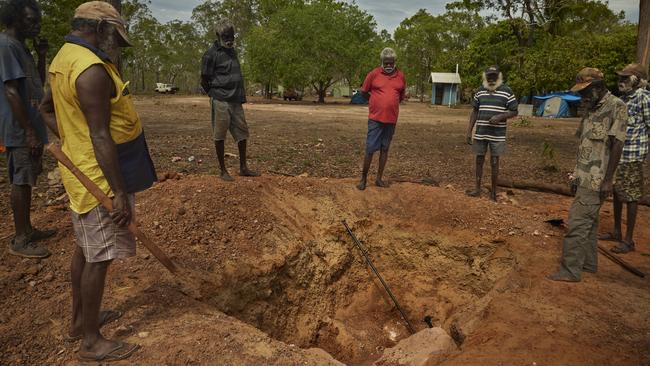
It’s not that Guyula doesn’t want to speak to Sharon – the problem is, he does. The importance of people having their say inspired him to change his electorate’s name from the seat of Nhulunbuy in 2019. Mulka is the Yolngu word for an advisory space, or a place where people meet for diplomatic discussions. It’s just that today he needs to get to the funeral.
Guyula goes in to pay for his $2.32 – a-litre fuel, and returns a couple of minutes later smiling. Sharon had vanished.
As he turns out of the petrol station onto the main drag, he talks about the struggle of having a foot each in the balanda (non-Indigenous) and Yolngu worlds. His voice is soft and he speaks in long, looping stories that veer in unexpected directions before winding their way back to the point. He says the increasing distance The Intervention created between the two worlds triggered his run for office.“It was a blanket that suffocated people,” he says of the National Emergency Response brought in by the federal government in 2007. “It completely disempowered people. There were senior, respected elders collecting rubbish in the community. People like my wife and other women had to go to women’s groups and paint rocks and seashells. These were people with qualifications who were working. The intervention pulled apart their knowledge and skills.”
He points to a day when federal police pulled him over on a bush road on his grandmother’s country near Ramingining as a watershed moment. “They said to me, ‘Who are you and what are you doing here?’ That’s what they said to me!” All these years later, he’s still incredulous. “I said, ‘I’m the one that should be asking you that. Who are you and what are you doing on my country? This is my land! This is where I grew up!’” They breathalysed him, checked his licence, took his details, and Guyula decided it was time to act. He became a spokesperson for the Yolngu Nations Assembly, he met with leaders in other communities, and eventually, he decided to go in to politics. Guyula ran in the 2016 federal election as a test, and when he polled well in northeast Arnhem Land, he ran in the NT election later the same year.
Guyula confesses he felt uncomfortable in Nhulunbuy when he was first elected. Labor had held the mostly balanda mining town seat since 1980, and had been so confident their incumbent Lynne Walker would win, they’d announced her as deputy chief minister before the final count.
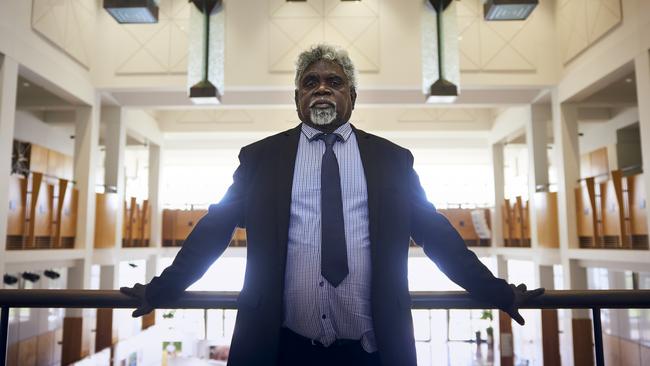
Within two hours of the polls closing, Labor declared victory and Walker was celebrating with her colleagues. Disheartened, Guyula jumped in his car and headed for Ramingining, where he planned to take the barge home to Milingimbi Island. Mobile reception was little to none on the 400km drive, so all Guyula had for company was his thoughts. Well, at least I tried, he remembers thinking. “Then I got to the barge landing in range of a mobile phone and my daughter called and said, ‘Dad, what are you going to do?’ And I said, ‘I’m disappointed, my daughter, I lost the voting’, and she said, ‘But you won’.” While Guylua was driving, the outcome had changed. He’d gotten over the line by eight votes.
Guyula won convincingly in remote Aboriginal communities and homelands, and the NT Electoral Commission boundary redistribution had added Milingimbi, where he lives, and Ramingining, his grandmother’s country, to the seat for the first time. Nobody saw it coming and many didn’t take it well. Labor flagged a possible legal challenge, then Guyula was taken to the Court of Disputed Returns (the case was ultimately dismissed). Rumours began reaching his team that because he was an outsider, Guyula didn’t care about the town of Nhulunbuy and was a puppet for his non-Indigenous supporters. “Lots of people were against me and attacked my ideas, but I’m strong enough to take that,” he says. “I just said, I will listen to people. I will stand between Indigenous and non-Indigenous people. It was in me, what I am, and people have been able to see that.”
Guyula’s reception in Nhulunbuy has improved since then. His 2020 election win, again over Walker, was convincing and his ability to bring remote issues to parliament in ways others can’t seems to have won over his detractors.
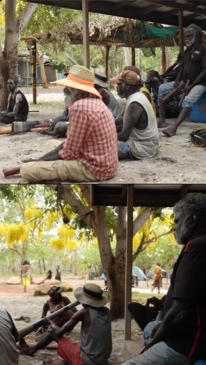
Guyula’s daily life could be described as a laundry list of the Territory’s hot-button issues. He has been impacted by crime, justice, housing and health. Last year Guyula’s nephew died after he was stabbed outside a shopping centre in Darwin and his brother by kinship was killed in a hit-and-run on the city’s outskirts. Guyula and his wife have lived in a tent, then a caravan, outside the overcrowded family home in Milingimbi. They recently replaced the caravan with a shipping container, which they hoped to move into before the wet season arrived. Health problems are rife. His niece, the woman whose funeral we are attending, died suddenly of an unknown medical episode. She was 35 and had a young child.
“In my strength, I am here to tell the government there is something really wrong in our communities,” he says.
The car jolts with the Central Arnhem Road’s corrugations, and a passing 4WD kicks up a fog of red dust that turns the windows sepia. A frill-necked lizard sits bolt upright in the middle of the track, surprised to encounter traffic. At the last minute, it sprints into the scrub.
The further Guyula gets from the bitumen, the more he relaxes.
He is going home.
Born in the bush around Buckingham Bay in1958, Guyula was the second of six boys. His family lived a traditional life on their ancestral lands. They constructed shelters from paperbark and moved from waterhole to waterhole, relocating with the seasons to ensure bush tucker – wallabies, yams, fish – was always available.
“We were looking after the country, and country looked after us,” he says.
As a small boy, he watched from the banks of the Arafura Swamp as his father and other clansmen caught saltwater crocodiles from a canoe using a harpoon and a rope. “Really skilful work,” he says. On a good day, the croc meat would be enough to feed their clan and the neighbouring clans, and the skins would be sold to balanda. On a bad day, the croc would be the one to get a feed. Guyula’s father was once attacked, though the bite was nothing serious. “If the croc had wanted to kill him, it would have.”
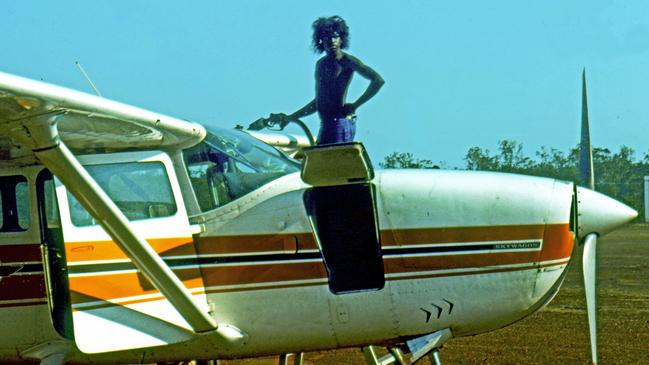
In the late 1960s, Guyula’s father got a job in the logging industry and the family moved to Galiwin’ku on Elcho Island. It saw their living situation go from wide open space to a one-room tin shed – and it deeply affected Guyula, who has become a strong advocate for Indigenous people being able to live on country.
The best thing Galiwin’ku had going for it back then, as far as Guyula was concerned, was a school. It wasn’t until he got into the classroom that his teachers realised 10-year-old Guyula didn’t speak any English. “Kids started laughing at me because I couldn’t read and write,” he recalls. He was sent back to the lowest grade, but rather than give up, Guyula rallied. “It was embarrassing – but then again, my intelligence told me it’s just like another Yolngu Matha language. Because I learned so many languages at home, I picked up the English language quickly, and I started reading and writing very quickly.”
He soon skipped ahead of the students who’d made fun of him and went away to Dhupuma College, an Indigenous boarding school in Nhulunbuy. One school holidays when he was a teen, a teacher invited Guyula to stay with him in Brisbane. Guyula had never left the NT before and it was his first time living with a balanda family. He was taught to make a bed with sheets and blankets, and how to use a knife and fork. He watched on perplexed as people put on running shoes and sunglasses and went for a jog. Guyula had never really thought about getting fit and healthy – it was just something that happened when he lived out bush.
Until his sojourn in Brisbane, no one had ever mentioned the fact that he was Aboriginal. “A balanda child came up to me and said, ‘Hey, you’re black’ – that was the first time realising about black and white,” he remembers. “It was the first time I’d been called black.”
When he finished his schooling, Guyula set his heart on becoming a car mechanic on Elcho Island, but there were no vacancies at the local workshop. Then someone mentioned there was a job going with Mission Aviation Fellowship, an airline servicing northeast Arnhem Land. He started out cleaning the airline’s workshop; after a few months, someone handed him a spanner and soon he was changing propellers, replacing tyres, fixing wheel bearings and doing inspections. When his elders saw he could pull a plane to bits then put it back together, they insisted his boss teach him to fly.
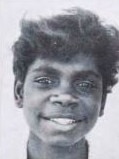

In the early 1980s, Guyula began pilot training, then moved to Ballarat to get his private pilot’s licence. Flying was the easy part; when it came to exams, Guyula struggled. “I failed a lot of written exams because they were about questions and answers,” he says. “In the Yolngu way of education, it’s about observing and participating … going out to the bush and watching your parents, how they hunt and how they sneak up behind a buffalo or a crocodile. It was an education with no questions asked like, ‘How did you do it, how did you spear that buffalo?’ So I failed a lot of exams, but my practical flying was all above average.”
He was training for his commercial pilot’s licence when his two worlds really began to clash. His elders told him it was time to return to his country and participate in ceremony. He’d achieved a lot in the balanda world, but now he needed to learn to be a cultural leader.
“Living in balanda world, living in Yolngu world, were pathways that were going away from each other,” he says. “I was like a dog running between two masters.”
It’s a conflict that has followed him all his life.
As day nudges into night and purple clouds begin to bruise the sky, we arrive at Gapuwiyak, a Yolngu community of about 700 people. Guyula drops me at my $220-a-night donga and goes straight to the funeral site, 20km away in Bunhangura, to set up his tent.
The next I hear of him is Djambarrpuyngu coming through a microphone the following morning. Gapuwiyak is so compact that the council loudspeaker acts as a kind of town crier, and Guyula’s voice rings out across the community. A ranger tells me he’s talking about crime rates, domestic violence, youth engagement and incarceration. There’s been some trouble here recently and Guyula wants people to think about how to better manage anger and grief, the ranger explains. He’s trying to keep the peace.
A clever political move, I say when Guyula picks me up – an easier vehicle for self-promotion than doorknocking his enormous electorate. But he corrects me. “This is my home community, it’s not my electorate community,” he says.
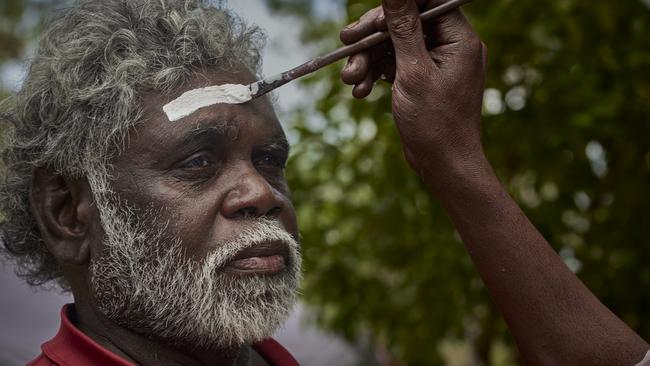
“I speak here as a Yolngu leader.”
As he negotiates the dirt track back to the funeral, he explains that he doesn’t just represent the people in his electorate (black and white) – he also represents all Indigenous people across the Northern Territory. “A lot of Yolngu have said to me, ‘We need a strong voice’, so I just stand beside Yolngu to try and push through, make voices loud, make voices be heard.”
All this talk of giving people a voice, yet Guyula was initially wary when it came to the Voice referendum. He feared it could be used as another “colonial institution”, and his support came with parameters. “The Voice is the messenger – and it must not speak over the top of people but amplify the grassroots voices from across Australia,” he wrote in his Mulka newsletter in April 2023. Yet he ultimately landed on the side of Yes. “Voice, Treaty and Truth are about First Nations people having the power to decide our future.”
The result was disappointing, he says, but he’s still hopeful. “We are ready. If the government is fair with us they need to understand that we are ready for treaty.”
The paperbark-hemmed track opens up and Guyula drives slowly into the funeral site.
To say Bunhangura is small is an understatement. It’s one of 600 homelands – remote Aboriginal living areas defined by people’s cultural or traditional relationship to the land – sprinkled across the Northern Territory. Bunhangura is just two blue houses, a tin-shed toilet, a public phone and six (soon to be seven) graves. Usually two families live here, but this week more than 100 Yolngu are here staying in tents. Men and women sit in the shade and cook damper; kids climb trees and play footy and throw a ball through a basketball hoop made from an old milk crate strapped to a tree.
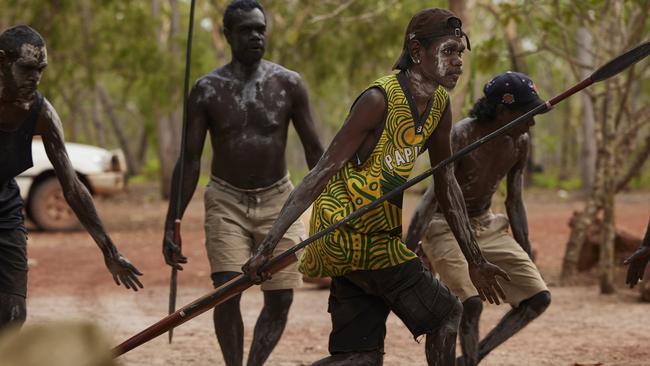
Guyula points to one of the homes. His niece’s body is inside, he says, her name sacred and therefore unspoken. No one will talk about how she died. It’s too painful. They can’t bury her until every clan is satisfied cultural obligations have been met. “Everything we do over the next few days is to make sure spirits will be guarded and will rest peacefully,” he explains.
We’re standing under a sprawling golden shower tree with an overspill of brilliant yellow flowers, when suddenly, as if triggered by an invisible signal, the day’s bunggal (ceremony) starts.
The yidaki hums. Clapsticks smack. The guttural tones of Indigenous song join campfire smoke in the air. Men stomp their feet into the sandy earth, holding red-handled spears. Some have paint across their bare chests. One has a brightly coloured ceremonial dillybag around his neck. Beside him is a man in a Chicago Bulls singlet. They’re joined by women in patterned skirts, who hold sticks and look at the ground as they move their way through the dance.
When they finish, the next clan rises, this time outside the dead woman’s home. More people join in on the outskirts. At the centre is a young boy in shorts, about seven or eight years old, whose face is a picture of such concentration I can’t take my eyes off him. Occasionally his eyes flick to his elders for guidance.
“This isn’t just a show,” says Guyula. “It’s spiritual, it’s education, it’s discipline, it’s leadership.” He grabs some clapsticks and joins in.
Guyula opened his maiden speech in parliament in October 2016 by announcing he didn’t want to be there. “This is not something that I wanted to do,” he said. “I did not want to become a politician, but we Yolngu have tried many ways of gaining recognition of Yolngu law, and none have worked.”
Since then, he has advocated for raising the age of criminal responsibility, better health facilities and improved resources in Aboriginal homelands. Homelessness, education, chronic disease, alcohol abuse, child protection and poverty are all on his agenda. He pushes constantly for Yolngu sovereignty and acknowledgment of Yolngu law, and the need for treaty. He has twice delivered speeches at the UN Permanent Forum on Indigenous Issues in New York.
However, I’m surprised to discover that in 2017 Guyula voted against broadening access to the abortion drug RU486. When I trawl back through the parliamentary record Hansard to read the debate, I find that Guyula had determined the subject was “women’s business” and sought feedback from women in his community. Their overwhelming response was no. “I cannot support the bill,” he told parliament. “Rather, I support that the women who have authority and knowledge in this area should be properly and respectfully consulted and that our diverse communities be considered every time legislation is introduced in this chamber.”
When, in 2019, police shot an Aboriginal man at Yuendumu, Guyula put forward a motion for an inquiry into remote policing on Aboriginal land with the aim of improving police relations with residents and reducing crime. He received support from the independents, but every Labor and Country Liberal Party member voted it down. Guyula’s frustration spilt over like a wet season storm. “Do you want me in this parliament? Do you want Indigenous people to stand in parliament? Or is this only a white man’s space?” he questioned. “I’m not here to fight the government. I’m not here to argue with you. I was simply voted to come here and work with you, and discuss issues – what is happening in our communities. You need to listen. Come with me and we’ll solve those problems.”
Respected elder, educator and 2024 Senior Australian of the Year Yalmay Yunupingu says having a Yolngu politician from a remote area representing Indigenous people is “very important”. “It’s brave for him to speak for Indigenous people,” she says.
For Guyula, it’s more about persistence than bravery. It took three years of fighting before he was granted permission to speak his mother-tongue in the parliamentary chamber. He then delivered a blistering speech about the importance of bilingual education. “Schools for Aboriginal children must embrace their identity, not undermine it,” he said in Djambarrpuyngu. “This is your failure, not ours … You set us up to fail.”
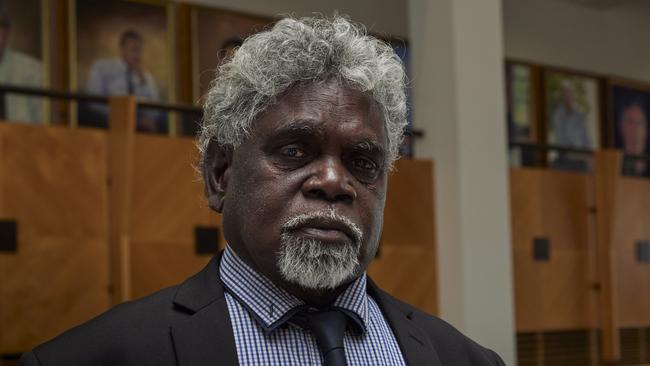
For Yunupingu, listening to that speech was a particularly proud moment. “I had goosebumps,” she says. “Language is our power. Language is sacred. Speaking in Yolngu Matha in Parliament House promotes people that are strong in culture.”
Around 30 per cent of the NT population identifies as Aboriginal and of the 25 members that make up the Legislative Assembly, six are Indigenous. But Guyula is the only one not tethered to a party. Although his position as an independent can hamstring his ability to make change, it also means he can speak freely on a range of topics, which appeals to the balanda in his electorate too.
Kris Keogh, a non-Indigenous artist and music producer who lives in Nhulunbuy, handed out how-to-vote cards for Guyula in the 2020 election. It was a controversial move – Keogh’s father was a former president of Labor’s Nhulunbuy branch. “Yingiya [Guyula] is someone who gets the issues of local people and will happily go in to bat against everyone else,” he says. Environmental issues are important to Keogh.
In 2018, the NT Government lifted a moratorium on fracking. Since then it has also steamed ahead with plans for a major manufacturing hub for gas, petrochemicals, hydrogen and minerals in Darwin Harbour. “There is a lot of pressure on the NT Government to make money and grow the economy and big business, but that must not come at the cost of the environment,” Guyula said in parliament last year. “Remote communities will suffer first, but we will all suffer in the end.”
“It’s like he’s the government’s conscience,” says Cunningham from Sky News. “He’s all the things that they say they are, that they’re not.”
Independent Member for Araluen, Robyn Lambley, sees it a little differently: “He is a thorn in Labor’s side. They can barely conceal their reluctance to deal with him, but as one of only a few traditional Aboriginal people in the parliament, they know that to mistreat or disrespect him is at their own peril.”Although their political views rarely align, Lambley says she has enormous respect for Guyula. “He votes according to his conscience, there’s no bullshit.”
Recently, she adds, the parties have been courting him. Guyula has noticed it too. He intends to run in the NT general election in August, and he thinks it will be a close poll. It could put him in a powerful position. “It’s possible that independents could hold the balance of power because it’s so close, which might then allow us to make real progress towards changes in the NT that bring benefit for Aboriginal and balanda people across the NT,” Guyula says.
Cunningham reckons that’s a real possibility – all it would take is for Labor to lose two seats in the election. A traditional Yolngu man holding the balance of power could change Territory politics forever, the Sky News reporter says.
Back at Bunhangura the next morning, the homeland feels more subdued. Yesterday I’d been surprised to see no one crying, but today it is as if the sadness has seeped in. After the rocks-in-the-grave situation is resolved, Guyula leads me to a group of young people sitting under a mango tree heavy with green fruit. They are the gong-djok – the people caring for the body until burial – and they are painting their skin with red ochre.
Among them is 22-year-old Melvina Ngangaratjpi Wanambi, who grew up here before going to Nhulunbuy for school. Now she’s a member of Norforce, a regiment of the Australian Army Reserve. She says she chose this role of caring for the body because she was a friend of the woman who died. I ask Wanambi if she’s ever been to a balanda funeral. She shakes her head and says: “Does it usually take just the one day?” I tell her yes, and when she recovers from the oddness of that, she explains why I haven’t witnessed any crying here yet. “Usually we do cry at night, and the major clan singing is at the end, that’s when their hearts will melt,” she says. “That’s when the sorrow comes up, because that’s when they are telling us it’s nearly the end to take her to the grave.”
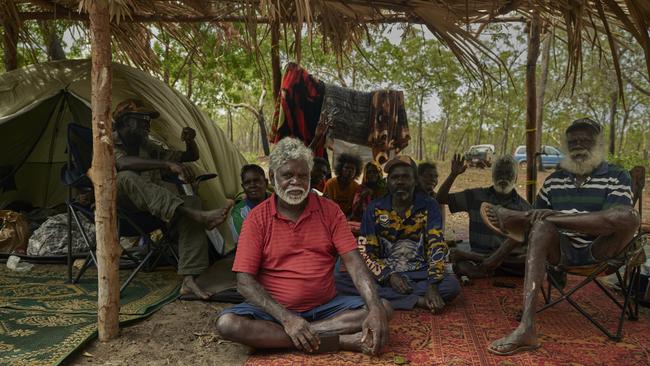
She talks about the role of dance in ceremony, and I ask her about the boy who caught my attention yesterday. He’s the son of the woman who died, she tells me. “He’d never danced before,” she says.
Wanambi sits beside the other gong-djok, and Guyula joins them on the ground. He speaks in Djambarrpuyngu for a good 10 minutes and the young people listen respectfully. When he’s done, he summarises in English for me. He’s been talking about the important role they are playing here. It’s not only spiritually significant, it also preserves law, culture and harmony. Wanambi has been listening closely. She admires Guyula as both a Yolngu leader and a parliamentarian. “I would love to follow in his footsteps,” she says.
The dress code is formal. The schedule,timed down to the minute. The location: NT Parliament House. Two days after sorry business has concluded, Guyula is in the belly of the building known to locals as the “wedding cake”. Most think the nickname is on account of its grand white columns, but cynics say it’s because it’s pretty outside, dry and useless inside.
I sit in the public gallery for day three of the final sittings for 2023. From here, I can see what every member of the Legislative Assembly is doing – and not doing. Two are on social media, one is signing Christmas cards. Another is sending a message on their phone.
Dressed in a dark suit and a navy tie he knotted months ago so he can slip it over his head for meetings, Guyula stands to speak on the proposed changes to alcohol laws. He tells them that in October, in the weekend break between the previous sittings, he stopped at a bottle shop on Darwin’s outskirts after a hunting trip and tried to buy four beers. “The bottle shop attendant looked at me, then looked at the address on my licence. Because my address was Milingimbi, a dry community, they would not sell me the beer,” he says. “Every white person around me was able to make a purchase at that shop; I was turned away. What is implied in this exchange is that I am not as responsible as everyone else. I am a problem and I do not deserve to be treated fairly.”
As Guyula details the devastating effects that racial profiling has had on him, on his people, on society as a whole, his fellow parliamentarians scroll and scribble and text. It’s not disrespect directed at him; in almost every speech here, no matter what side of politics, there is chatter. What is striking is the contrast from a few days ago, where a barefoot Guyula sat in the sand and a group of young people listened intently to his words.
When his objections are noted but the bill passes, it feels different in every way from when Guyula went from clan to clan after they’d hit rocks while digging the grave, consulting them all until a unanimous decision was reached.
From his niece’s funeral four days ago to this chamber today, it’s clear the Yolngu and balanda worlds are still miles apart. Although he confesses this weighs heavily on him at times, it also serves as a reminder that he must persist. He must stand tall and speak loudly about inequality. He must give people a voice.
Even if in one world it sometimes feels like he’s not being heard, like those ancestral rocks, Guyula won’t be moved.





To join the conversation, please log in. Don't have an account? Register
Join the conversation, you are commenting as Logout